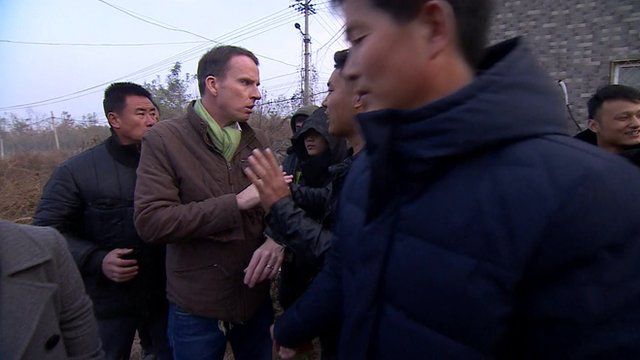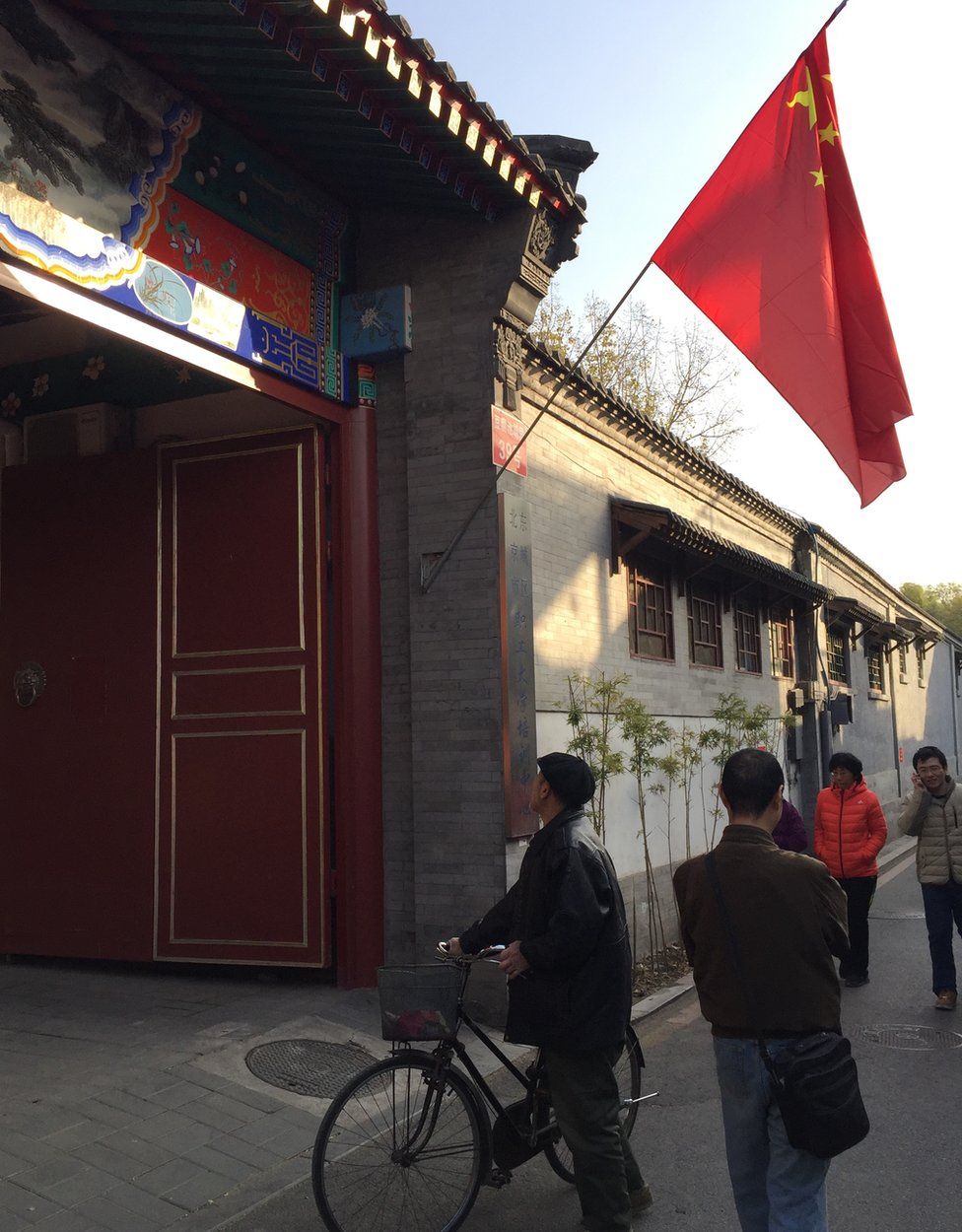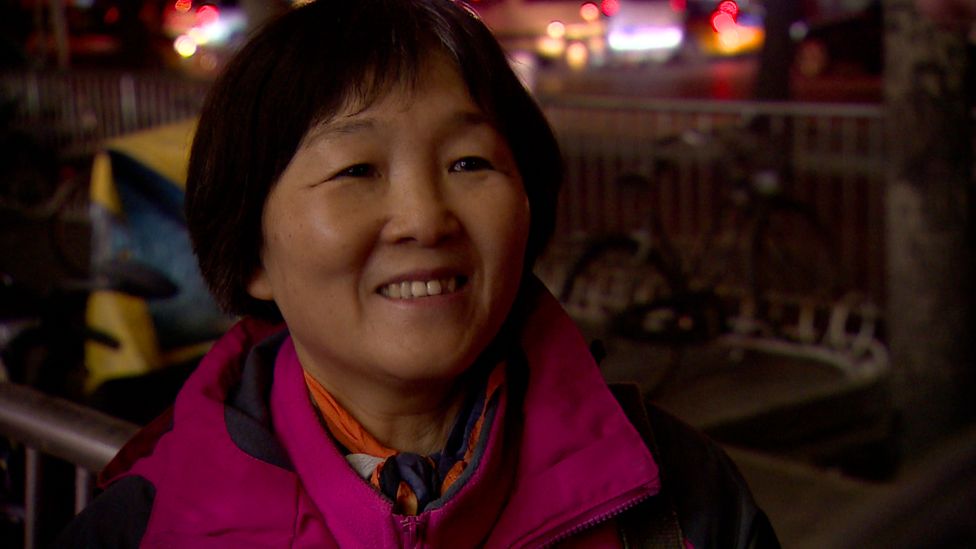BBC stopped from visiting China independent candidate
17 November 2016 Last updated at 00:18 GMT
BBC stopped from visiting China independent candidate
While the world continues to digest the result of the US election, China is holding its own nationwide ballot - one of the biggest anywhere.
By early next year, up to 900 million people will have voted in China's district elections.
But while the Communist Party has been highly critical of what it sees as the "farce" of American democracy, it's not so keen on scrutiny of its own system, as the BBC's John Sudworth found out.
Oroginal site: http://www.bbc.com/news/world-asia-38005603
China elections: Independent
andidates fight for the ballot
By John Sudworth
BBC News, Beijing
17 November 2016 China

BBC blocked from visiting China independent candidate
China's constitution allows independent candidates to run in local elections but it is a futile exercise for those who dare to get their names on the ballot.
In the heart of Beijing's old alleyways, the polling station is bathed in autumn sunlight. It is busy. An elderly man has turned up with his wife on the back of his tricycle.
Three nurses, clutching their voter registration certificates, arrive on foot in deep conversation while election officials and policemen oversee the whole affair.
On the surface, it is a scene that would be recognisable to voters in democratic countries the world over. But of course, this is China and the reality is very different.
We drive to the outskirts of Beijing to meet Liu Huizhen, a 45-year-old woman who wants nothing more than the right to take part in this election.
'Not a puppet'
She has managed to secure the ten nominations from fellow citizens that, according to Chinese law, are needed to allow her name to go forward for inclusion on the ballot as an independent candidate but she is not out campaigning.
Instead, she is living under constant surveillance and, as we approach her front door, it is quickly surrounded by a group of unidentified men who stand in silence and block our way.
By reaching over their heads I manage to knock and a few moments later, Ms Liu appears in her doorway.
But as she begins to tell me why she wants to exercise her democratic right, the door is pushed shut and the thugs lean against it.
She makes an attempt to open a window but it too is forced shut and she is, once again, prevented from speaking to us.
China calls its five-yearly, nationwide exercise in voting the "world's largest election".

Local polls are the only chance most Chinese people get to vote
This week it is Beijing's turn, but by early next year, according to state-run media, 900 million people the length and breadth of China will have cast their ballots.
As a result, more than 2.5 million deputies will take their seats in thousands of local "people's congresses".
Those local deputies will in turn "elect" the city and provincial level congresses above them, and so on all the way to very top.
So these local polls are the only chance most Chinese people get to vote but there is a crucial, unofficial caveat. It is the Communist Party that decides who gets on to the ballot.
For the vast majority of would-be independent candidates the task of obtaining the requisite ten nominations is made so difficult that their quest for office is over before it even begins.
We arrange to meet another election hopeful, 59-year-old Ye Jingchun, at her apartment complex in Beijing.
The residents' committee has called a meeting to introduce the approved list of candidates, which Ms Ye is not on, and we are hoping to speak to her after the meeting is finished.

Ms Ye decided to run as an independent after a frustrating time finding her local delegate
This time it is a police officer who is there at the entrance waiting for us.
We are not allowed in and Ms Ye is not allowed out but a few hours later we manage to catch up with her.
"They were polite," she tells me, standing on the pavement outside a shopping mall. "But I couldn't leave the room. There were more than a dozen of them."
Her motivation for wanting to stand is a simple one.
"I was once trying to find my own local delegate and I could not, I did not even know who he was," she tells me.
"So I told myself, if I become a delegate, I could serve people who are at the bottom of society, who really need their delegate's help. I would not be a puppet."
Luckier than Americans?
It is a noble calling, one that would be recognised by those who choose to represent their local communities the world over.
But here, it is little more than a futile aspiration.
"First of all, we need to get the nomination forms," Ms Ye tells me, "which are extremely difficult to get. In fact, the community officer warned residents not to nominate me."
There has been scant coverage of the local elections in China's state-run media, beyond the usual bald facts and figures.
Nonetheless, an altogether different kind of election, a long way from China, has been occupying the attention of the Community Party's propagandists.
China's journalists have had full, unfettered access to America's open system of democracy and have used that access to full effect.
They have covered the US election as a case study in all that is wrong with Western democracy - the dissatisfaction with elites, the bitter, divisive nature of the campaign and the concerns over media bias and corporate influence.
And Chinese readers of this Communist Party-led reporting have been constantly reminded that they should think of themselves as lucky.
The US campaign has been described as "circus-like," a "chaotic political farce" and a "train wreck".
Of course, some of those sentiments could very well be written from the pens of Western journalists.
That, though, is the point.
Democracy is recognised, even by its strongest proponents as flawed and vulnerable to manipulation but that does not necessarily make it worse than the alternatives.
Public dissent, social discord and a simmering resentment of the ruling classes are not unique to America or Britain.
And the thuggery and heavy-handed control are signs that behind the supposed political unity of China's one-party state lies a deep unease.
It springs from the knowledge that even one independent candidate presents a threat to the very premise on which the whole system is based.
There is no reciprocal, open invitation to the foreign media to freely observe, report and comment.
Outside Ms Liu's house, the thugs have had enough.
The group, now some 20 or 30 strong, grab at our coats and drag us roughly down the road to where our car is parked.
Original site: http://www.bbc.co.uk/news/amp/37997706
 English (UK)
English (UK)  中文(简体)
中文(简体)  中文(正體)
中文(正體) 
